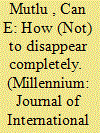|
|
|
Sort Order |
|
|
|
Items / Page
|
|
|
|
|
|
|
| Srl | Item |
| 1 |
ID:
149107


|
|
|
|
|
| Summary/Abstract |
Reproducibility is held to be the gold standard for scientific research. The credibility of published work depends on being able to replicate the results. However, there are few incentives to conduct replication studies in political science. Replications are difficult to conduct, time-consuming, and hard to publish because of a presumed lack of originality. This article sees a solution in a profound change in graduate teaching. Universities should introduce replications as class assignments in methods training or invest in new stand-alone replication workshops to establish a culture of replication and reproducibility. This article will first discuss the benefits of conducting replications. The main part will focus on concrete steps in integrating replication in the classroom, from selecting a paper to final manuscripts. Drawing on the author's own teaching experience as well as that of others, particular emphasis will be on the pitfalls and challenges of letting students replicate work, as well as potential criticism. Only if universities nurture a reproducibility and replication culture can we ensure that the gold standard of reliable, credible, and valid research is not just an empty phrase.
|
|
|
|
|
|
|
|
|
|
|
|
|
|
|
|
| 2 |
ID:
139425


|
|
|
|
|
| Summary/Abstract |
The question of research methods, and their role in the field, is a major source of contention for IR scholars. We can, however, discuss method, methodology, and innovation without revising or revisiting old debates. Methods do not have to be divisive, or disciplining. A frank discussion of research design, methods, and methodological preferences is essential to innovation and reproducibility. This intervention is a call for increased transparency in IR research outputs; IR theorists should not erase their own footprints from their publications and openly admit and discuss failures as productive moments in research. The act of disappearing, which has become the norm in the name of professionalised publications, robs the field of the productive pedagogical potential of research methods. The true impact of research rests in its pedagogical potential. As researchers, our job is thus to find a sensitive balance between not determining the outcome of the research from the get-go by making it all about our preferences and opinions, but also not making the impact of our preferences and opinions disappear completely. Building on this premise, this intervention discusses the significant pedagogical potential of research methods, reproducibility and discussion of failures in International Relations.
|
|
|
|
|
|
|
|
|
|
|
|
|
|
|
|
| 3 |
ID:
149103


|
|
|
|
|
| Summary/Abstract |
Replication is widely seen as an important way to promote transparency and quality control of published work in the social sciences. In international relations, the replication movement moved forward with a panel at the International Studies Association in 2002, subsequently published in this journal. The publication included a joint statement by four editors of leading quantitative journals in international relations, pledging their journals to a set of minimum replication standards and urging other editors to follow suit. Over the years, these and other journals have posted hundreds of data sets. Nevertheless, progress has been slow, and many journals still have no policy on replication or fail to follow up in practice. In this forum, we discuss how improvements can be made to current policies and practices and how replication can be used systematically in teaching international relations and extended to qualitative work.
|
|
|
|
|
|
|
|
|
|
|
|
|
|
|
|
|
|
|
|
|